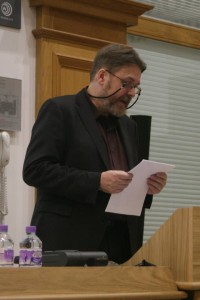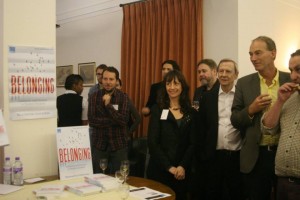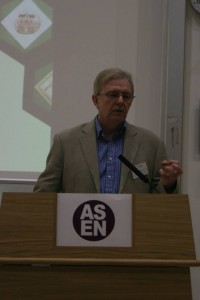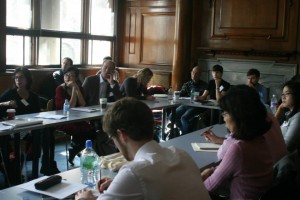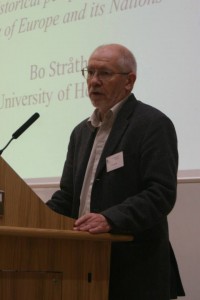The 24th annual ASEN Conference, on ‘Nationalism and Belonging’ and organized by Eleanor Knott and Joseph Downing, was a considerable success, as well as one of the best-attended conferences since ASEN’s foundation. The conference was preceded by the Gellner Lecture given by Professor Joep Leerssen of the University of Amsterdam on ‘The Nation and the City: Urban Festivals and Cultural Mobilization’, and the launch of two new books by academics associated with ASEN. These books are Montserrat Guibernau’s Belonging: Solidarity and Division in Modern Societies, and The Cultural Politics of Nationalism and Nation-Building: Ritual and Performance in the Forging of Nations, eds. Rachel Tsang and Eric Taylor Woods (the latter volume resulted from the 2011 ASEN Conference on ‘Forging the Nation: Performance and Ritual in the (Re)Production of the Nation’).
Left: Professor Joep Leerssen gives the 2014 Gellner Lecture. Right: one of this year’s book launches
In selecting the theme of ‘belonging’, the conference organizers aimed to generate a dialogue on two fundamental debates within nationalism studies: the origins and nature of nationalist commitment, and how to define nationalist belonging. Papers presented at the conference addressed these issues from both an empirical and theoretical perspective and sought to identify strengths and weaknesses of traditional modes of nation-centred belonging.
Professor John Hutchinson (LSE) opens the first plenary session
Topics that were covered in the conference panels included inter alia: the nature of (national) belonging; ethnographies of belonging; belonging and memories of warfare; transnational belonging; belonging and borderlands; and belonging and governing. There was a diversity of historical and contemporary themes, ranging from considerations of nationalism in the medieval period to ‘digital’ or ‘internet’ nationalism and economic nationalism of today. Six plenary lectures given over the course of the three days gave further structure, with reflections on themes such as friendship and nationalism, discourses of national inclusion and exclusion in the 21st century, diaspora nationalism, and nationalism and global narratives.
Right: ASEN President Professor John Breuilly (LSE) closes the proceedings
More photos of the conference proceedings can be found on ASEN’s Facebook page. All photos courtesy of long-standing ASEN-ite and Nations and Nationalism editorial board member Dr. Steven Mock. Recordings of the Gellner Lecture and the plenary addresses will appear on the ASEN YouTube page. Studies in Ethnicity and Nationalism will also be considering paper submissions for a special conference edition. For further information on the planned conference edition, please contact the editors at sen@lse.ac.uk.
The Association for the Study of Ethnicity and Nationalism (ASEN) is an interdisciplinary student-led research association founded by research students and academics in 1990 at the London School of Economics & Political Science. ASEN seeks to fulfill two broad objectives:
1) To facilitate and maintain an interdisciplinary, global network of researchers, academics and other scholars interested in ethnicity and nationalism;
2) To stimulate, produce, and diffuse world-class research on ethnicity and nationalism.
These objectives are achieved via: a global membership; ASEN’s two leading journals Nations and Nationalism and Studies in Ethnicity and Nationalism (SEN); regular conferences, lectures, seminars, and publications; and The Ruritanian, ASEN’s newsletter, which provides updates on key information in the field.
facebook.com/ASENevents
twitter.com/ASENevents – #ASEN2014
youtube.com/ASENevents
The conference was made possible through the kind support of the LSE Department of Government and the LSE Annual Fund.


